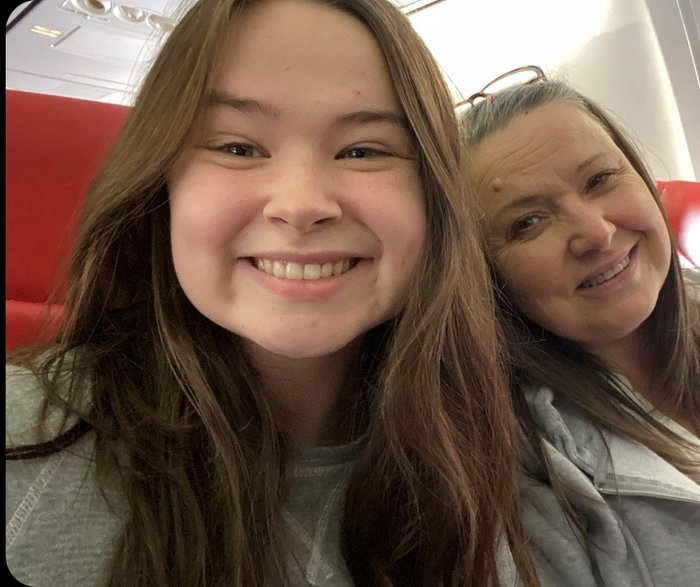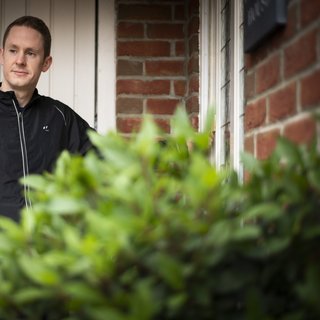Nobody talks about how difficult it is to tell people you’ve got cancer.
Sophie was diagnosed with chronic myeloid leukaemia (CML) in 2023, when she was in her fourth year of university. She explains how one of the hardest parts of coming to terms with everything was telling her friends and family she had cancer.

I hadn’t realised just how tricky I would find telling others about my diagnosis. I was told I had CML during my fourth year of medical school in Dundee, which is just over an hour away from my family in Glasgow and even further from my dad down south. This meant I had to tell them all over phone or by text message.
During my initial appointment, one of my immediate thoughts was how to tell my mum about my diagnosis. I knew she was going to find it incredibly hard to hear, and I knew I would really struggle to tell her and change her entire world. I grew up in a house with just me, my mum, and sister, so we’re a very close family unit. We have been pretty lucky in terms of good health overall, with little need for GP or hospital visits, and so I knew a cancer diagnosis out of the blue would be shattering for us as a family.
I ended up phoning mum shortly after my appointment, whilst waiting in line for bloods. Looking back, this was probably not the best way to tell her I was diagnosed with cancer (sorry to everyone in the queue who heard me!) but I just had no idea how to navigate this entirely new and weird situation I had found myself in. There aren’t really any resources out there to guide you in breaking the news to other people, and I think this is something that should be recognised more during those initial appointments, as it’s something most people will need help with.
I knew that CML would change their lives too, and change how everyone looked at me. Having a friend or family member with cancer brings worry into your life, which I didn’t want to give them, and it changed who I am as a person, which I wasn't ready for.
For most of the rest of that first day I was messaging other people and reassuring them. Chronic myeloid leukaemia is a rare form of blood cancer and not well-known amongst the public. This means nobody had any idea of how it would affect me and what treatment options were available. People assumed I would be undergoing chemotherapy, but my treatment is actually very different and involves taking daily medication. I told my family and friends that whilst I had cancer, the prognosis was very good and that I would likely live a normal lifespan.
Even though this is relatively ‘good’ news it was and still is very hard to talk about, because although I will be okay in the long run, at that point in time I didn’t feel okay, and I wasn’t sure how okay my future would be. CML, and any type of cancer, always throws your future and life plans up in the air. I had plans of graduating medical school and starting a family, and whilst I can still have these, CML makes those landmarks in my life much more difficult to obtain.
So, I was unwell, and needed a lot of extra support, but I hadn’t a clue what that would look like or how to ask for it. I was also afraid of being unwell, especially as I knew I would probably be unwell for a long period of time. I hadn’t yet accepted the reality of that, which is a big part of the reason I found it so difficult to tell others.
Telling people you have cancer is a difficult conversation to have, and it wasn’t like any I’d had before. Looking back, I probably didn’t approach it in the best way. But having no guidance in how to tell others I did what I thought was best at the time.
If I was to give anyone who has been diagnosed with a blood cancer advice on telling those close to them, it would be to do it your own pace when you feel ready. I jumped into telling everyone because I felt I needed to tell them straight away, but this was before I had even processed the reality of the situation myself. Take your time in feeling your feelings. It’s absolutely shattering to hear those words ‘you have cancer’ and my mind began spinning and didn’t really stop until months later.
I’d also say, tell people in a way that feels comfortable to you. Saying the words out loud is really hard in those first few days. If you need to write it out or text them instead, then do it that way. Making the process easier for you is the most important part. You may even want to ask someone else to help you tell others. Do what you need, not what you think you should do. And it’s also okay to not know! The first few days after diagnosis are weird, and unlike any other I’ve experienced. You aren’t going to have all the answers and that is okay.
Ultimately, having a good support system was a life saver for me during my diagnosis and still is now, a bit further down the line. After my diagnosis, I thought I just wanted to spend time alone and not see anyone. However, I’m really glad my family and friends didn’t give me a choice and came to see me anyway. It made a hard day easier, and I was so happy to see some friendly faces and get comfort from those close to me.
My final piece of advice would be to not worry so much about saying ‘the right thing’ or doing things ‘perfectly’ because if you allow those around you to just be there for you, it can make life after a cancer diagnosis so much easier.

